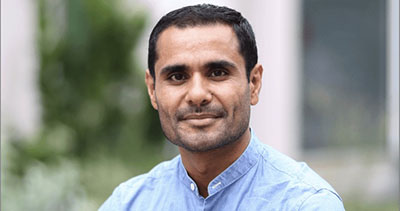Campus News
Tahir Amin to speak about unequal access to medications and the global fallout from intellectual property wars: October 18 talk in downtown Santa Cruz
Tahir Amin, a critic of the power structures that result in the unequal distribution of desperately needed medications across the globe, will be the inaugural speaker of the Sawyer Series focusing on “Race, Empire, and the Environments of Biomedicine.”

An expert on intellectual property law, Tahir Amin is a critic of the power structures that result in the unequal distribution of desperately needed medications across the globe, including vaccines.
Amin will talk about this pressing issue at 7 p.m., Tuesday, October 18 at the Kuumbwa Jazz Center in downtown Santa Cruz. Doors open at 6 p.m.
The talk is presented by The Humanities Institute at UCSC. The event is free and open to the public, but advance registration is required. Reserve your seat here.
Amin is the inaugural speaker for the Sawyer Seminar series of public lectures, scholarly talks, and reading and discussion groups focusing on “Race, Empire, and the Environments of Biomedicine.”
Amin is executive director of the Initiative for Medicines, Access & Knowledge (I-MAK), a nonprofit organization working to address structural inequities in how medicines are developed and distributed.
He argues that excessive vigilance about patents and intellectual property interfere with the distribution of life-saving technologies, especially in the poorest nations.
Amin has over 25 years of experience in intellectual property (IP) law. In that time, Amin has practiced with two of the leading IP law firms in the United Kingdom and served as IP Counsel for multinational corporations. His work focuses on re-shaping IP law and the related global political economy to better serve the public interest.
Associate professor of history Jennifer Derr, whose scholarship explores the intersections among science, medicine, and the environment, will introduce the event. Anna Barry-Jester, a Propublica reporter covering global health, infectious diseases, and pandemics, will be in conversation with Amin after he gives a brief presentation.
The Mellon Sawyer seminar, which will run throughout 2022-2023, takes a critical look at American biomedicine, while examining how issues regarding race, imperialism, and the environment impact the ways that medications are developed and distributed.
This series is supported by the Mellon Foundation and presented in partnership with the Science and Justice Research Center. The $225,000 award supports the Sawyer Seminar series on the Comparative Study of Culture, bringing scientists, physicians, and scholars of the humanities and social sciences together with students and members of the UCSC community.
The Kuumbwa event is timely for the UCSC community, especially considering that UC scholars have been taking aim at inequities in the distribution of much-needed medication.
Addressing structural inequities in a time of need
Amin argues that the globalization of intellectual property, starting in the 1980s, has coincided with some of the world’s deadliest pandemics, epidemics and outbreaks, from HIV, hepatitis C, SARS, and, most recently, COVID -19.
A former Harvard Medical School Fellow in the Department of Global Health & Social Medicine and TED Fellow, Amin has served as legal advisor/consultant to many international groups, including the European Patent Office and World Health Organization, and has testified before the U.S. Congress on intellectual property and unsustainable drug prices.
Amin will guide the Kuumbwa audience through his organization’s journey over two decades fighting the ever-growing intellectual property systems being pushed by the US, the EU, and the pharmaceutical companies that block affordable access to medicines for billions of low/income populations around the world. Amin and I-MAK have also put out a 10-point plan for the Biden-Harris administration to bring equity into the patent system. Their work was highlighted in the New York Times Editorial Board’s recent endorsement of patent reform.
Register here for this free event.